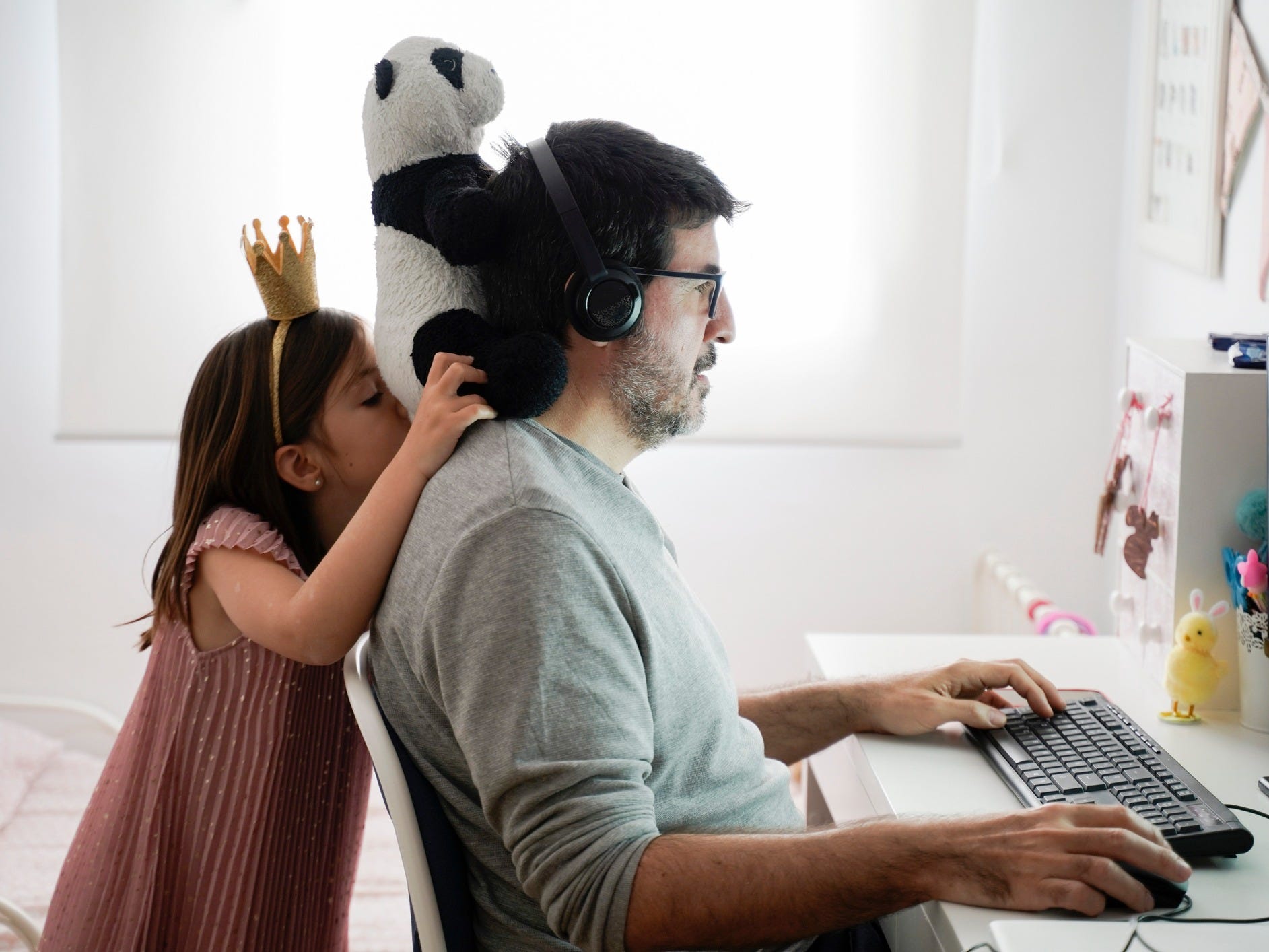Sign up here to receive our newsletter Gender at Work in your inbox twice a month.
It seems like eons ago that the so-called BBC Dad was interrupted by his bespectacled, pigtailed daughter while giving a live interview.
Actually, that happened in 2017. But the idea that someone can be a professional and a parent – and that kids function with only minimal awareness of this thing adults do called work – is no longer news, exactly. (A similar clip filmed more recently, of a woman being interrupted by her daughter while giving a live BBC interview, has gotten considerably less attention.)
Workers around the world have been logging in from home since March, meaning it’s the rare occasion when someone’s kid, partner, or pet doesn’t appear on a video call.
On some level, that's a good thing. Maybe when life returns to some semblance of normalcy, working parents won't feel the need to conceal their family life from colleagues.
Welcome to Gender at Work.
This is a twice-monthly newsletter that takes a broad look at how your gender identity informs your career. In the last newsletter (the inaugural installment) I wrote about the long-term career implications for women who are shouldering extra burdens at home right now.
This week I'm exploring two possibilities for parenthood after the pandemic. Here's the first.
Possibility 1: Stigma around working parents (especially mothers) may fade
This potential shift may be especially meaningful for working mothers, who can be wary of disclosing their parental status.
A growing body of research suggests that, in many cultures, mothers are perceived as less competent and as less committed to their jobs than women who don't have kids. A 2018 study published in the journal PLOS One found that these gender biases may boil down to certain "myths" about motherhood, like the idea that family life suffers when the mother works full-time. (In fact, a 2015 Harvard Study found that daughters of mothers who work outside the home tend to be more professionally successful than their peers whose mothers stayed at home.)
So the fact that parents can't reasonably hide their family life in the remote work era, coupled with the fact that many mothers are still meeting their job expectations, could turn out to be a positive development for future generations of working parents.
That's one possibility. Here's another.
Possibility 2: Working parents (especially mothers) may reach a breaking point and drop out of the labor force

For many individuals and couples, managing a career and a family in a pandemic may just be unsustainable.
A roughly 2,000-person survey run in April by people-analytics platform Werk Labs found that parents of one child are 10% more likely than non-parents and parents with two or more kids to say they plan to leave their employer within a year.
More often than not in a mixed-gender couple, if someone's career has to take a backseat, it's going to be the woman's. The Werk Labs survey found that women were nearly twice as likely as men were to say they planned to quit their jobs within a year's time. Meanwhile, a University of College London study found that mothers in England are 47% more likely than fathers to have lost or quit their jobs due to the pandemic.
These two possibilities aren't mutually exclusive
In some workplaces, parents may feel more comfortable letting their managers know when they need to, say, leave early to pick up their kid from school. Other parents may find their employer and their job requirements aren't flexible enough to accommodate that kind of request.
That difference depends partly on socioeconomic factors. In fact, the pressures of parenting during the pandemic may intensify social inequalities that already existed.
In an April 2020 report from The Center for American Progress, an independent think tank, senior fellow Jocelyn Frye writes that many women of color who are mothers are also breadwinners in their families. The same report indicates that many women of color are essential workers, which often means they have to work on-site. When schools and childcare centers are closed, these women may face an impossible choice between watching their kids and holding down jobs, i.e. keeping their family financially safe.
LGBTQ parents, who were already economically vulnerable, now face new challenges. A report from the Human Rights Campaign Foundation, which advocates LGBTQ-inclusive policies and practices, indicates that LGBTQ individuals are more likely to hold jobs that are being eliminated during the pandemic, such as retail and food service.
The pandemic may also force same-sex parents to prioritize one partner's job while the other focuses on caregiving, potentially leaving the caregiving partner to fall behind professionally. The New York Times' Claire Cain Miller reported (pre-pandemic) that in families headed by same-sex couples, one parent often winds up putting childcare and housework before their career - a pattern seen in mixed-sex and mixed-gender couples as well.
Some employers are more supportive of working parents than others

There aren't (yet) clear paths for working parents who are struggling right now.
My colleague Taylor Nicole Rogers reported that the Families First Coronavirus Response Act entitles employees at certain companies to up to 12 weeks of coronavirus-related paid leave - but only at businesses with fewer than 500 employees.
Some employers are giving parents space to articulate their concerns and their needs, instead of assuming they can't complete their work. Erica Galos Alioto, the chief people officer at Opendoor, recommends that managers ask parents whether they need to adjust their work schedule. Galos Alioto, pictured above, writes, "We have encouraged team members to have realistic conversations with each other about what we can prioritize and get done."
At Asana, Anna Binder, the company's head of people, encourages managers to have candid conversations with the parents on their teams. Binder said she helped one woman, a single mother with two kids under age three, build a schedule and a set of expectations for her colleagues about when the woman would and wouldn't be available.
Again: These interventions are just starting points. It's hard to find a working parent who's breezed through the past few months. Binder remembered talking to that single mother after the first day of working remotely with her kids at home. "Holy shit," Binder recalled the woman telling her. "This is not possible."
I invite you to share personal stories about the way parenting has affected your career, and vice versa. In the meantime, please share this newsletter with friends and colleagues. If this email was forwarded to you, sign up here.
I'm also interested to know: Are there specific leaders or themes we should spotlight in this newsletter? Send suggestions to me at [email protected]. I'm excited to read them.

